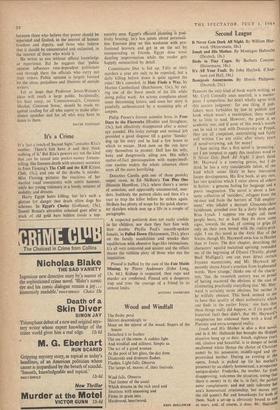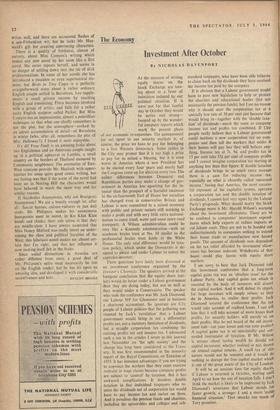Second League
Bourgeois Anonymous. By Morris Philipson. (Deutsch, 21s.) PERHAPS the only kind of book worth writing, as Mr. Cyril Connolly once asserted, is a master- piece. I sympathise, but don't wholly agree with this austere judgment: for one thing, if pub- lishers were forbidden by law to publish any book which wasn't a masterpiece, there would be so little to read. However, the point is an academic one, and if none of this week's novels can be said to rank with Dostoievsky or Proust, they are all competent, entertaining and fairly well written. Can any critic, after ninety years of novel-reviewing, ask for more? I hate saying that a first novel is `promising,' yet I am tempted to apply this insidious word to It Never Gets Dark All Night. I don't think Mr. Hayward is a towering genius, but I do think he has a very considerable talent, of the kind which seems likely to have interesting future developments. His first book, at any rate, has two qualities which I value above all others in fiction : a genuine feeling for language and a poetic imagination. The novel is about a fan- tastic collection of 'outsiders,' refugees from the rat-race and from the horrors of `full employ- ment,' who inhabit a decrepit Gloucestershire farmhouse, presided over by a dotty Irish poet, Bran Lynch. I suppose one might call these people beats, but at least they do show some signs, towards the end, of coming to grips (if only on their own terms) with the reality-prin- ciple. I see this novel as the Antic Hay of the Sixties, though Mr. Hayward owes less to Huxley than to Joyce. The first chapter, describing the characters' squalid matutinal uprising, reminded me of the beginning of Ulysses (Stately, &MP Buck Mulligan'); one can even detect certain Joycean mannerisms, and Mr. Hayward ap- parently shares Joyce's aversion from hyphenated words. `How strange,' thinks one of the charac- ters, 'that the twentieth century was so proud of having mastered the obvious at the cost of eliminating practically everything else.' Mr. Hay- ward is certainly never obvious, but neither is he wilfully obscure. This book seemed to me to have that quality of sheer authenticity which one finds in the earlier Joyce: one feels that these things really did happen, or if (in point Of historical fact) they didn't, that Mr. Hayward 'S imagination has endowed them with a kind of Platonic and extra-temporal reality. Jonah and His Mother is also a first novel, and in it Mr. Haltrecht has brought the CEdirnts situation bang up to date. Jonah, eighteen years old, clueless and beautiful, is in danger of being swallowed whole (hence the choice of Christian name) by his possessive, middle-aged and ha' poverished mother. During an evening at the opera, Jonah is picked up (in his mother's presence) by an elderly homosexual, a prosperous antique-dealer. Frederika, the mother, far front disapproving, welcomes the situation, seeing that there is money in it; she is, in fact, the perfect mere complaisante, and not only tolerates her son's homosexual relationship, but moves int°, the old queen's flat and housekeeps for both et them. Such a sot-up is obviously bound to earl in tears, and, of course, it does. Mr. Haltrecht
writes well, and there are occasional flashes of a sub-Firbankian wit, but he lacks Mr. Hay- ward's gift for creating convincing characters.
There is a quality of freshness, almost of nafvety, about Miss Comyns's writing which makes any new novel by her seem like a first novel. She never repeats herself, and seems in no danger of settling down into the rut of slick professionalism. In some of her novels she has introduced a macabre or even supernatural ele- ment, but Birds in Tiny Cages is a perfectly straightforward story about a rather ordinary English couple settled in Barcelona. Leo supple- ments a small private income by teaching English and translating; Flora becomes involved with a group of artists, and falls for a rather nasty English sculptor called Parker. But Miss Cornyns has an impressionist, almost a pointilliste technique, so that what one chiefly remembers is not the plot, but the atmosphere—evoked by an adroit accumulation of detail—of Barcelona in winter (who, after all, remembers the plot of Mrs. Dalloway?). I found it most enjoyable.
It's All Your Fault is an amusing frolic about two Englishmen and an American couple caught up in a political upheaval in Lambia, a small country on the borders of Thailand menaced by Communist neighbours. The anomalies of East- West relations provide Mr. Haylock with oppor- tunities for some quite good comic writing, but my feeling was that if the scene of the novel had been set in Notting Hill the characters would have behaved in much the same way and for similar reasons.
If Alcoholics Anonymous, why not Bourgeois Anonymous? We are a beastly enough lot, after all: fascist hyenas, culture-vultures or just dull clods. Mr. Philipson makes his anonymous bourgeoisie meet in secret, in Ku Klux Klan hoods and cloaks; their sole crime is that they are middle-class. I have always suspected that Miss Nancy Milford was really intent on under- mining the class and political loyalties of the West; this hilarious novel makes me almost cer- tain that I'm right, and that her influence is now making itself felt in the States.
Since social distinctions in America are rather different from ours, a good deal of Mr. Philipson's satire must necessarily be lost on the English reader; but he has hit upon an amusing idea, and developed it with considerable































 Previous page
Previous page